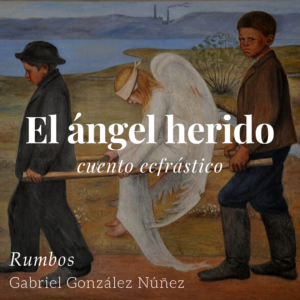I was working with the editor at Jade Publishing to see a handful of Spanish-language short stories I had written become a book. The publisher’s designer had put together a cover I really liked. I was excited. And then I received a surprising e-mail: we should probably dump the title and call your book something else. My original title, which read something to the tune of “Eleven Fantastical Stories and Four Sad Stories” probably wouldn’t work. Perhaps I could come up with something different? Okay, fair enough. So I sat down to change the title. But nothing. I was baffled.
To be honest, I normally struggle picking titles. Whether it’s a poem or short story or a novel, it’s not unusual for me to be done and still have no idea what to call the piece. I had chosen a very descriptive title because it seemed to fit. The first eleven stories are fantastical in that they include what I can best describe as magical realism, and the final four stories are sad because they are realistic and unhappy. Now I couldn’t get Gérard Genette out of my mind. True, Genette explained in Paratexts: Thresholds of Interpretation (Seuils, in the original French) that the only obligatory function of a title is to designate the work, in other words, that the act of giving a name to a book is in practice providing it with an identifying designation. And yet, he added, a title may seek to tempt someone to read the book in question. And that was the challenge. A strictly descriptive title wasn’t working. How to tempt the reader into the book?
 What I did was think about what tied the fifteen stories together. There is a sense in them of movement. Several of the characters engage in actual travel, but mostly the stories are about inner movement, about the paths taken within. So I knew there was something in there about journeying. Then I jotted down several possibilities that included verbs of movement. I read them to my wife, and she didn’t care for any of them. Thus, I continued writing down different things, each version tighter than the previous one. I finally condensed it to a single word: rumbos. The word is a Spanish noun that refers to the direction one follows, the course or heading that is being taken. This seemed to be the recurring theme in an otherwise eclectic collection that includes both angels and vampires, court interpreters and battered women, pirates and the Grim Reaper.
What I did was think about what tied the fifteen stories together. There is a sense in them of movement. Several of the characters engage in actual travel, but mostly the stories are about inner movement, about the paths taken within. So I knew there was something in there about journeying. Then I jotted down several possibilities that included verbs of movement. I read them to my wife, and she didn’t care for any of them. Thus, I continued writing down different things, each version tighter than the previous one. I finally condensed it to a single word: rumbos. The word is a Spanish noun that refers to the direction one follows, the course or heading that is being taken. This seemed to be the recurring theme in an otherwise eclectic collection that includes both angels and vampires, court interpreters and battered women, pirates and the Grim Reaper.
I wrote my editor with the new title: Rumbos. It was descriptive and hopefully enigmatic enough to get people to open the book. She replied promptly: “¡Vaya! Este título tiene fuerza y cohesión.” [Wow! That’s a strong and cohesive title.] So I was happy.
Last July, we launched the book via Facebook. The event was facilitated by my editor Rossy Lima and took the form of a conversation between R. de la Lanza and me. We discussed the book, and this theme of wandering in search of something came up time and time again. (If you speak Spanish, you can check out the discussion below.) So it would seem the title works. Or at least that’s what I hope. In the end, such journeys are both the challenge and the beauty of literature.


Enjoyed